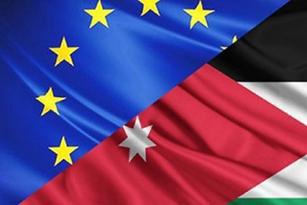- Local News
- Sun-2020-10-18 | 03:10 pm

Nayrouz News Agency :
Benefitting from the agreement to simplify rules of origin with the European Union (EU) requires activating the role of economic diplomacy, intensive marketing campaigns and better public-private partner-ship, according to experts.
The agreement to simplify rules of origin was signed in July of 2016, giving a window of opportunity to boost exports to European Union (EU) countries through sim-ple conditions, and in 2018 the agreement was simplified further with more facilitations for Jordanian exporters.
"The relaxation of the rules of origin basically gave a window of opportunity to export to the EU through sim-ple conditions to meet the rules of origin; it was 60 per cent local material in the product, and changed to 30 per cent,” Iyad Abu Haltam, head of the "Made in Jordan” campaign and member of the Amman Chamber of Commerce (ACC), told The Jordan Times on Saturday.
In a phone interview, Abu Haltam said that the rules in-clude employing 15 per cent Syrian workers out of the total, instead of 25 per cent Syrians in the export produc-tion line, noting "now it has become very easy to meet the conditions, which were an obstacle when they were complicated before.”
However, only around 10 companies managed to benefit from the agreement, which Abu Haltam said is due to "the failure of the public and private sectors to enter the markets through marketing schemes, distribution chan-nels and tackling the marketing strategy”.
"We need to go into international exhibitions and have a pavilion designated for Jordanian products, and to sup-port the SMEs [small- and medium-sized enterprises] that are willing to take their products to the European markets, because these international exhibitions are very expensive,” Abu Haltam said.
He added: "Nine square metres in such exhibitions cost more than 30,000 euros in participation fees; and thus in the last four years we lacked such a vision to determine a point of entry.”
In his capacity as head of the "Made in Jordan” campaign and a member of the ACC, Abu Haltam said he believes the entry should be done through eastern or central Eu-ropean countries, such as the Czech Republic, Slovenia and Poland to target the rest of Europe.
The ACC member called for supporting SMEs through paying for transportation and logistics’ costs, especially at the beginning, and making use of any digital or virtual exhibitions, creating contact between Jordanian exporters and main EU distribution channels, such as big compa-nies, hypermarkets and big importers.
"We are identifying the main fields of products that have the potential to be exported to the EU, and they include food industries, chemicals, detergents, fertilisers and cer-tain types of equipment and machinery, all of which have a good chance of being marketed in European coun-tries,” Abu Haltam noted.
He called for utilising economic diplomacy, which he said having the private sector work with the Ministry of Foreign Affairs, through their commercial attaches in European countries, to promote Jordanian exports and gather data as well.
"We have a problem in regard to data on European mar-kets, because they are not traditional markets such as Iraq, Gulf or Egypt, which are easily contacted and easily understood in terms of business language, European countries conduct business differently,” Abu Haltam noted.
He said it is the responsibility of the private sector and chambers of industry to upgrade their export, marketing and sales’ skills, which he said is all part of the new strategy of "Made in Jordan”.
Abu Haltam said that many companies, from a technical point of view, are ready to export to the EU, meeting all the conditions of the agreement.
The private sector should participate actively to achieve exporting with the support of the public sector to access the market, which can be done through a unified nation-al strategy to handle EU markets instead of scattered pro-grammes that are short-term and short-lived, he added.
Economist Mazen Marji said that the problems that hin-der Jordanian products from reaching European countries either lie in the product itself for not meeting the re-quired standards, or quality products that lack proper marketing, or quality products that reach European mar-kets but lack after-sale services.
Marji suggested creating a group for companies that share the goal of exporting to European countries, which serves the purpose of helping all participants to access the market together as a group, not as individuals.
"There are around 40 agricultural and industrial products that we can possibly export to the EU, and creating such a group, with the support of the government, the private sector participants of commerce chambers, and by the EU itself, helps improve exporting chances” Marji said.
The economist said the group could also help the compa-nies working together to work on market studies and learn the needs of the European market as well as learn more about competitors, reducing dependency on the government in the process, negotiating with big import-ers and supply chain officials.
He concluded that there also needs to be guarantees on Jordanian products and after-sale services, allowing pur-chasers to have a point of contact in case they face any issues with the products, creating more credibility and avoiding limited exportation and losing the opportunity for lack of trust.
The experts agreed that with proper preparation, market-ing and products, the deal, which extended from 2026 until 2030, is a big chance for Jordanian companies and factories to export their products to European markets.
The deal also included all factories in the Kingdom when further simplified in 2018, after it was limited to only 18 industrial zones, minimising the condition to provide 200,000 jobs for Syrians to only 60,000 as well, according to data from the Ministry of Trade, Industry and Supply.








